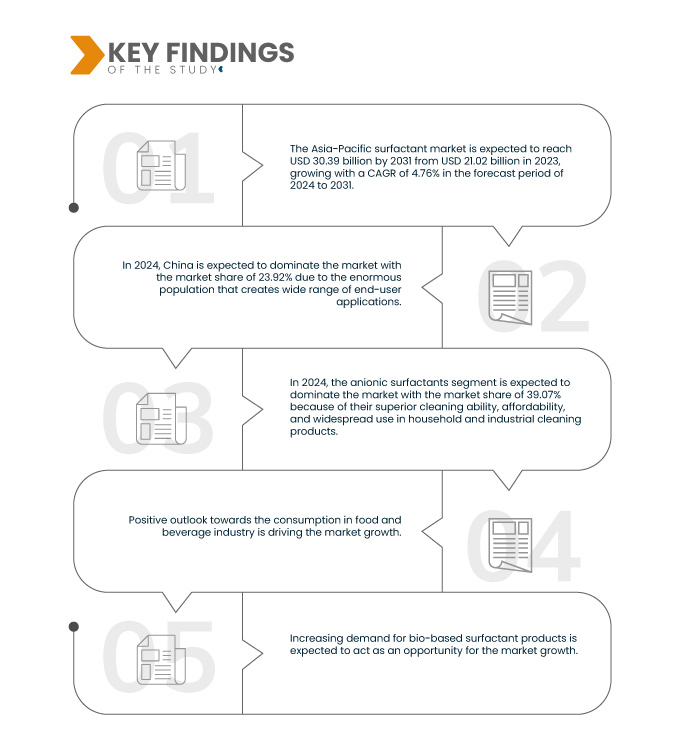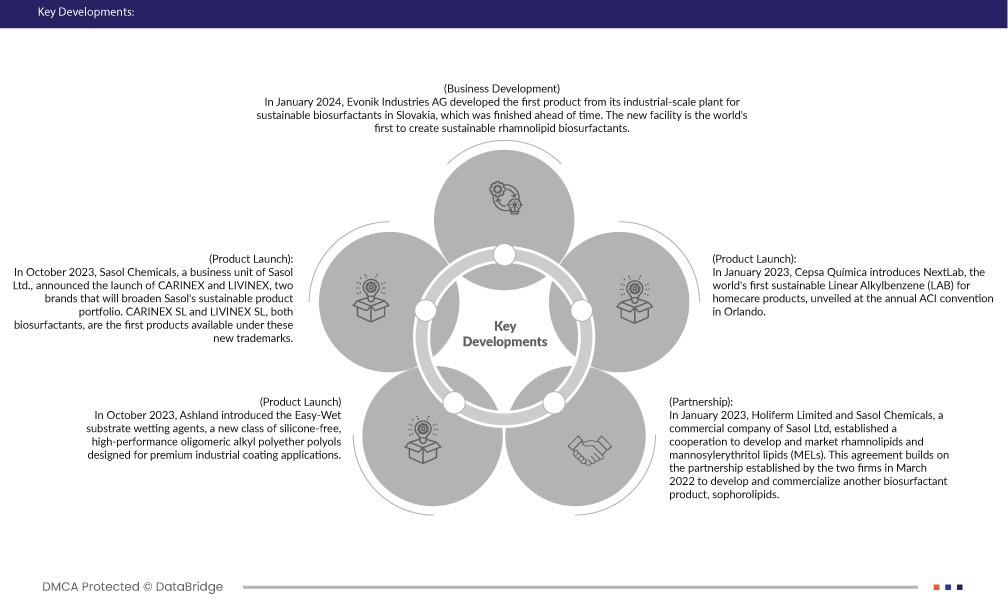Surfactantes são moléculas que exibem propriedades hidrofílicas (atraem água) e hidrofóbicas (repelem água). Esses compostos desempenham um papel crucial na redução da tensão superficial entre líquidos e sólidos ou líquidos e gases. Em diversas indústrias, os surfactantes são empregados para estabilizar emulsões, melhorar a umectação e espalhamento de líquidos e facilitar a remoção de sujeira ou óleo das superfícies. Sua capacidade de alterar propriedades interfaciais torna os surfactantes essenciais em aplicações que vão desde produtos de limpeza doméstica até formulações farmacêuticas e processos industriais. No geral, os surfactantes contribuem para a eficiência e eficácia de diversos sistemas líquidos, modificando suas características superficiais e interfaciais.
Acesse o relatório completo @https://www.databridgemarketresearch.com/reports/asia-pacific-surfactant-market
A Data Bridge Market Research analisa que o Mercado de surfactantes Ásia-Pacífico deverá atingir US$ 30,39 bilhões até 2031, contra US$ 21,02 bilhões em 2023, crescendo com um CAGR de 4,76% no período de previsão de 2024 a 2031.
Principais conclusões do estudo
Aumento da demanda por surfactantes em produtos de cuidados pessoais e higiene
Na indústria de beleza e cuidados pessoais, os surfactantes têm aplicações variadas, como formação de espuma, limpeza, espessamento, solubilização, efeitos antimicrobianos, aumento de penetração e muitos outros efeitos especiais. Sua compatibilidade com óleo e água é um atributo chave das moléculas de surfactantes que os tornam altamente úteis como Cosmético ingredientes.
A tendência crescente para bio-surfactantes para uso em produtos de cuidados pessoais deverá ajudar no crescimento do mercado geral de surfactantes de beleza e cuidados pessoais.
Espera-se que a crescente aplicação de surfactantes no cuidado domiciliar impacte positivamente o mercado. A crescente consciência do consumidor em relação à higiene devido à disseminação de diversas doenças e vírus tem auxiliado na expansão do mercado com produtos para cuidados domiciliares, que incluem desinfetantes, detergentes, produtos de limpeza, xampu, lavar as mãos e outros. Espera-se que a forte demanda por tais produtos apoie o desenvolvimento do mercado. Assim, a crescente demanda por surfactantes está impulsionando o crescimento do mercado.
Escopo do relatório e segmentação de mercado
|
Métrica de relatório
|
Detalhes
|
|
Período de previsão
|
2024 a 2031
|
|
Ano base
|
2023
|
|
Anos históricos
|
2022 (personalizável para 2016-2021)
|
|
Unidades Quantitativas
|
Receita em bilhões de dólares e volume em quilotoneladas
|
|
Segmentos cobertos
|
Tipo (Tensoativos Aniônicos, Tensioativos Não Iônicos, Tensioativos Catiônicos, Tensioativos Anfotéricos, Tensioativos de Silicone e Outros), Substrato (Tensoativos Sintéticos e Tensioativos de Base Biológica), Aplicação (Sabonetes e Detergentes Domésticos, Cuidados Pessoais, Processamento Têxtil, Industrial e Institucional Limpeza, mineração, produtos farmacêuticos, tintas e revestimentos, produtos químicos para campos petrolíferos, processamento de alimentos, produtos químicos agrícolas, celulose e papel, fabricação de couro, polimerização de emulsões, agentes espumantes, lubrificantes e aditivos de combustível, plásticos e elastômeros, adesivos, galvanoplastia e outros)
|
|
Países abrangidos
|
China, Índia, Japão, Coreia do Sul, Malásia, Tailândia, Indonésia, Austrália, Nova Zelândia, Singapura, Filipinas, Vietname, Taiwan e Resto da Ásia-Pacífico
|
|
Participantes do mercado cobertos
|
Dow (EUA), BASF SE (Alemanha), Sasol Ltd. (África do Sul), Evonik Industries AG (Alemanha), KLK OLEO (Malásia), Indorama Ventures Public Company Limited (Tailândia), Kao Corporation (Japão), Reliance Industries Limited (Índia), Arkema (França), Godrej Industries Limited (Índia), Cargill, Incorporated (EUA), CLARIANT (Suíça), China Petrochemical Corporation (China), Stepan Company (EUA), Lion Corporation (Japão), Aarti Industries Ltd (Índia), ADEKA CORPORATION (Japão), Nouryon (Holanda), The Lubrizol Corporation (EUA), Lonza (Suíça), SABIC (Arábia Saudita), Sumitomo Chemical Co., Ltd. Bayer AG (Alemanha), SANYO CHEMICAL INDUSTRIES, LTD. (Japão), Croda International Plc (Reino Unido), Zanyu Technology Group (China), Ashland (EUA), GALAXY (Índia), EOC Group (Bélgica), Lankem (Reino Unido), DKS Co. CORPORATION (Taiwan), 3M (EUA), GEO (EUA), FoglaGroup (Índia), Goulston (EUA), Syensqo (Bélgica), ABITEC (EUA) e Matangi Industries (Índia), entre outros
|
|
Pontos de dados abordados no relatório
|
Além dos insights sobre cenários de mercado, como valor de mercado, taxa de crescimento, segmentação, cobertura geográfica e grandes players, os relatórios de mercado com curadoria da Data Bridge Market Research também incluem análises especializadas aprofundadas, produção geograficamente representada pela empresa e capacidade, layouts de rede de distribuidores e parceiros, análise detalhada e atualizada de tendências de preços e análise de déficit da cadeia de suprimentos e demanda
|
Análise de Segmento
O mercado de surfactantes da Ásia-Pacífico é segmentado em três segmentos notáveis com base no tipo, substrato e aplicação.
- Com base no tipo, o mercado de surfactantes Ásia-Pacífico é segmentado em surfactantes aniônicos, surfactantes não iônicos, surfactantes catiônicos, surfactantes anfotéricos, surfactantes de silicone, entre outros
Em 2024, espera-se que o segmento de surfactantes aniônicos domine o mercado de surfactantes da Ásia-Pacífico
Em 2024, espera-se que o segmento de surfactantes aniônicos domine o mercado com uma participação de mercado de 39,07% devido à sua capacidade de limpeza superior, acessibilidade e uso generalizado em produtos de limpeza doméstica e industrial.
- Com base no substrato, o mercado de surfactantes da Ásia-Pacífico é segmentado em surfactantes sintéticos e surfactantes de base biológica
Em 2024, espera-se que o segmento de surfactantes sintéticos domine o mercado de surfactantes da Ásia-Pacífico
Em 2024, espera-se que o segmento de surfactantes sintéticos domine o mercado com uma participação de mercado de 50,23%, pois são projetados para ter propriedades específicas, tornando-os adequados para uma ampla gama de aplicações em indústrias como limpeza, cuidado pessoale agricultura.
- Com base na aplicação, o mercado de surfactantes Ásia-Pacífico é segmentado em sabões e detergentes domésticos, cuidados pessoais, processamento têxtil, limpeza industrial e institucional, mineração, produtos farmacêuticos, tintas e revestimentos, produtos químicos para campos petrolíferos, processamento de alimentos, produtos químicos agrícolas, celulose e papel, fabricação de couro, polimerização em emulsão, agentes espumantes, lubrificantes e aditivos para combustíveis, plásticos e elastômeros, adesivos, galvanoplastia, entre outros. Em 2024, espera-se que o segmento de sabões e detergentes domésticos domine o mercado com uma participação de mercado de 39,30%.
Jogadores principais
A Data Bridge Market Research analisa DKS Co. (Japão), Dow (EUA), BASF SE (Alemanha), Lion Corporation (Japão) e Sasol Ltd. mercado.
Desenvolvimentos de mercado
- Em janeiro de 2024, a Evonik Industries AG desenvolveu o primeiro produto de sua planta em escala industrial para biossurfactantes sustentáveis na Eslováquia, que foi concluído antecipadamente. A nova instalação é a primeira do mundo a criar biossurfactantes ramnolipídicos sustentáveis. Os ramnolipídeos da Evonik Industires AG são de qualidade extraordinariamente alta, e o processo de fabricação baseado em fermentação e protegido por IP da empresa proporciona uma vantagem de mercado distinta
- Em Outubro de 2023, a Sasol Chemicals, uma unidade de negócios da Sasol Ltd., anunciou o lançamento de CARINEX e LIVINEX, duas marcas que irão alargar o portfólio de produtos sustentáveis da Sasol. CARINEX SL e LIVINEX SL, ambos biossurfactantes, são os primeiros produtos disponíveis sob estas novas marcas registradas
- Em outubro de 2023, a Ashland lançou os agentes umectantes de substrato Easy-Wet, uma nova classe de polióis alquil poliéter oligoméricos de alto desempenho, isentos de silicone, projetados para aplicações de revestimento industrial premium. Isso permite que a empresa produza inovações revolucionárias para o setor de revestimentos
- Em janeiro de 2023, a Holiferm Limited e a Sasol Chemicals, uma empresa comercial da Sasol Ltd, estabeleceram uma cooperação para desenvolver e comercializar ramnolípidos e lípidos manosileritritol (MELs). Este acordo baseia-se na parceria estabelecida pelas duas empresas em março de 2022 para desenvolver e comercializar outro produto biossurfactante, os soforolipídios. Sasol e Holiferm criarão e comercializarão formulações e utilizações para os novos compostos
- Em janeiro de 2023, a Cepsa Química apresenta o NextLab, o primeiro Alquilbenzeno Linear (LAB) sustentável do mundo para produtos de cuidados domiciliários, apresentado na convenção anual ACI em Orlando. O portfólio NextLab, incluindo NextLab-R, NextLab Low Carbon e o próximo NextLab-C, oferece alternativas ecológicas com propriedades semelhantes ao LAB tradicional. Como maior produtor de LAB a nível mundial, a Cepsa pretende minimizar a pegada de carbono, mantendo ao mesmo tempo detergentes de alto desempenho. NextLab-R e Low Carbon já estão em produção industrial, contribuindo para a redução das emissões de carbono e para a transformação da indústria
Análise Regional
Geograficamente, os países abrangidos pelo mercado de surfactantes da Ásia-Pacífico são China, Índia, Japão, Coreia do Sul, Malásia, Tailândia, Indonésia, Austrália, Nova Zelândia, Singapura, Filipinas, Vietname, Taiwan e resto da Ásia-Pacífico.
De acordo com a análise da pesquisa de mercado da Data Bridge:
China estima-se que seja o condado dominante e de crescimento mais rápido no mercado de surfactantes da Ásia-Pacífico
Estima-se que a China seja o país dominante e de crescimento mais rápido no mercado devido à enorme população que cria uma ampla gama de aplicações de usuário final e à sua vantagem competitiva em eficiência de produção e relação custo-benefício.
Para obter informações mais detalhadas sobre o relatório do Mercado de Surfactantes da Ásia-Pacífico, clique aqui –https://www.databridgemarketresearch.com/reports/asia-pacific-surfactant-market














